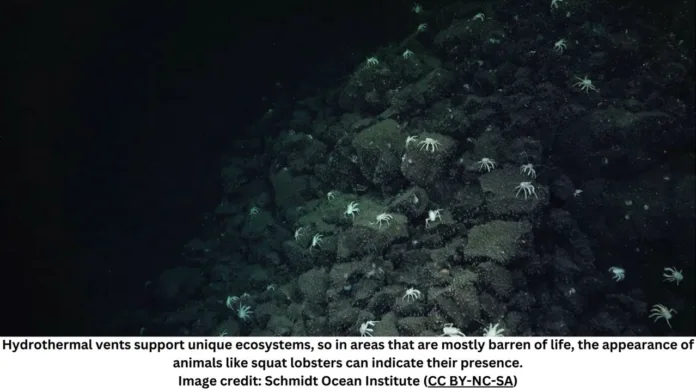Squat lobsters lead researchers to sprawling field of hydrothermal activity – unraveling the mysteries of the ocean depths
In a groundbreaking discovery in the Galápagos Islands, scientists have unlocked the secrets of the deep sea, thanks to an unexpected guide—crabs. The Schmidt Ocean Institute-led research team made an astonishing find as they followed a trail of squat lobsters, inadvertently unveiling a hydrothermal vent field named ‘Sendero del Cangrejo,’ or ‘Trail of the Crabs.’
The journey began in 2008 when researchers detected a chemical anomaly in the Galápagos Spreading Center (GSC) region. Expedition co-leader Jill McDermott, a chemical oceanographer at Lehigh University, detailed, “One of the anomalies that we look for is a lens of low oxygen water. Oxygen is completely removed through circulation in the seafloor. So the water that’s expressed at the seafloor is devoid of oxygen.”
Tracking the oxygen-poor, chemically enriched water, the team used a remotely operated vehicle to explore the ocean floor. To their amazement, they encountered a dense population of galatheid crabs, also known as squat lobsters. This accidental encounter led them to the expansive hydrothermal vent field located between the Cocos and Nazca tectonic plates, approximately 250 miles north of the Galápagos Islands.
The newfound ‘Trail of the Crabs’ spans an impressive 98,800 square feet, unveiling a rich ecosystem near the hydrothermal vent. Roxanne Beinart, a biological oceanographer at the University of Rhode Island and co-leader of the expedition, reported the presence of giant tube worms, large clams, and mussels in the vent field. She described, “There were giant tube worms, which can be a couple of meters long. There were very large clams, sometimes called dinner plate clams, as well as mussels.”
Hydrothermal vents, rare and enigmatic features of the ocean floor, result from volcanic activity. Cracks in the sea floor allow water to circulate through the ocean crust, heated by the Earth’s magma chambers, reaching temperatures of up to 400°C before emerging as hydrothermal vents.
